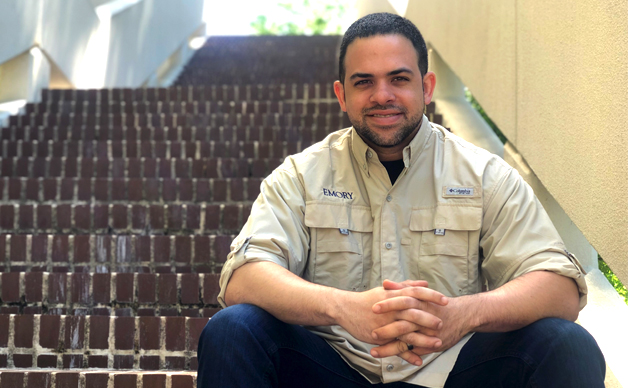Law student parlays difficult beginnings into academic success

Photo credit: Cynthia Varkey
On paper, Earl Porter III 19L is a textbook overachiever. He was an Eagle Scout, a summa cum laude graduate from his undergraduate university – he was even a distinguished military graduate, ranked number 1 out of 5,000 commissioning ROTC cadets nationwide. His list of achievements might suggest a charmed life and his compliance with a well-worn, proven pathway toward a juris doctor degree. To assume that, though, would be wrong. Porter – Chico to his friends – has had a stellar career thus far, but, much like in the old Sinatra standard, he did it his way.
In ninth grade, Porter attempted to emancipate himself from a troubled home, but there was no legal precedent in Georgia for youth under 16 to be considered financially independent. He went to school and worked odd jobs. He earned the good grades and leadership experience that netted him a four-year ROTC scholarship.
“People focus on what they want, only to immediately determine how to go about ascertaining it. An at-risk youth is simply one that has fewer hows than a well-resourced or well-endowed person,” Porter said. Fundamentally, his entire career has been about harnessing and maximizing the hows at his disposal.
After seven years as an infantry officer in the United States Army, he wanted a career change that would enable him to be a more present husband – and, one day, father – while meeting his spiritual desire to serve. He applied to several law schools, leaving Emory off his list because he thought he didn’t have the credentials for acceptance. His wife told him something that still resonates with him years later: “Make the people with the resources tell you no.”
He took on the challenge and applied to Emory Law through an Army program that would allow him to attend school free of charge. He received Emory’s acceptance notification before other schools responded but didn’t get into the Army program. Without sufficient resources, he called the dean of admissions and offered a reluctant “thanks, but I can’t.” Dean Ethan Rosenzweig pushed back, telling him to call back when he realized the Army was wrong, and he wanted to get creative about how to get to law school. After getting his acceptance deferred two years to allow his GI Bill time to maximize, saving up some money, and earning a scholarship award, he began his studies at Emory Law.
He arrived to the law school’s Gambrell Hall at 6 a.m. many mornings, putting in hours of study and work. He focused less on the traditional law student experience and tailored his approach to fit his needs. He interned for Isabel M. Garcia 99L and took on jobs as a teaching assistant and a coordinator for the mandatory advocacy training program in his third year. He also externed with the Internal Revenue Service, and serves as a captain in the Georgia Army National Guard, effectively interning with the State Judge Advocate Group.
His priorities have been family, career, and peace. They still are. If a thing does not help him improve the situation of either of those priorities, he does not entertain it. “I invested in a good pair of headphones to mitigate the distractions,” he joked. And now, he is prepared to graduate with honors, numerous scholarships in his rear view, several awards, and a juris doctor with a transactional law certificate. He recently accepted an offer to become an associate in Alston and Bird’s Atlanta office working with the Compensation, Benefits and ERISA Litigation group. What’s more, he has the admiration of his peers and his law school team.
Jill Camper, associate director for Student Life, said, “I have always been incredibly impressed by Chico. While no task is too big, what I appreciate most about him is that no task is too small. Our entire community is richer because of his dedication.”
The affection is mutual, it seems, as Porter notes a great appreciation for his law school experience – as atypical as it was. He cites a special warmth for Professor Timothy P. Terrell, whose classes he took and for whom he student taught. In a paper currently being readied with Terrell for publication, Porter outlines why Emory Law, and Terrell in particular, mattered so much to him. He writes:
I have noticed over time that the reason I begin a journey and the reason I finish it frequently correlate with my being inspired by another. For instance, I may have begun my Eagle Scout project for myself, but I completed it out of respect for the mentors who invested in me. I became an Airborne Ranger to emulate Col. [RET] Phil Baker. I came to law school to emulate two lawyers. I am finishing law school to provide for my family as a present father and husband, in a career that enables me to serve others.
Likewise, I am completing this milestone [Article] for you. ... You are a true leader. Thank you. Especially for giving me the tools to confidently communicate my voice.